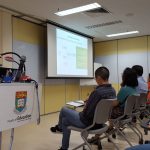Abstract
The educational potentials of social media both in the formal and informal learning contexts have been widely acknowledged. However, how social media use in the informal contexts might influence students’ learning in the formal contexts is still underexplored. Path analysis of 141 survey responses from secondary school ethnic minority students in Hong Kong revealed that voluntary access to Chinese social media in daily life influenced these students’ ideal L2 self and motivated efforts in learning Chinese both directly and indirectly via bicultural integration identity and bicultural competence. The findings confirmed that social media practices in the informal contexts may influence students’ motivated efforts in learning in the formal contexts. The study suggests promoting ethnic minorities’ extramural use of host culture social media to influence their acculturation into the host culture and motivation in learning the host culture’s language. It further highlights the importance of equipping ethnic minority students with the necessary socio-cultural and communication skills to facilitate positive intercultural engagement on these sites so as to safeguard the positive influences of informal social media use on students’ motivation for learning.
Speaker
Dr. Chun Lai
Associate Professor, Chinese Language and Literature Division, Faculty of Education, HKU
About the Speaker
Dr. Chun Lai is an Associate Professor at the Chinese Language and Literature Division, Faculty of Education. Her primary research interests are in technology-enhanced language teaching and learning, self-directed language learning beyond the classroom, and language teacher education. Her recent research work has been focusing on self-directed language learning with technology beyond the classroom. She has published a series of journal papers on this topic and a monograph – “Autonomous Language Learning with Technology beyond the Classroom”.
Date
30 April, 2018
Time
12:30-2:00pm
Location
Room MW 405, Meng Wah Complex
Chair
Dr. Xiao Zhang
- ‘Curses in TESOL’: Postcolonial Desires for Colonial English
- “Enhancing Data-Driven Learning in Disciplinary L2 English Contexts: Introducing CorpusMate”
- “Neither Bilingual nor Education”: critiques of bilingual education in state school education and responses to them
- A Two-Tiered Investigation Into the Dual Goal in EMI Education: Assessment and Instructional Practices
- Acculturation and digital trans-literacies in identity construction: An interdisciplinary perspective (Nov 6th, 2025)
- Appropriation of Resources by Bilingual Students for Self-regulated Learning of Science
- Auckland U – HKU Joint Webinar (28 November, 2024)
- Automated Content Feedback and Young English Learners’ Behaviours, Performances and Response
- Book Launch Seminar: Language Across the Curriculum & CLIL in English as an Additional Language (EAL) Contexts
- Critically Engaged Literacy Workshop as Decolonial and Anti-Racist Pedagogy (April 16th, 2025)
- Crosslinguistic influence in foreign and second language learners
- Developing Language Educators’ Understanding of Assessment Reform Discourse and Practices: School-University Collaborative Action Research as Praxis
- Digital literacy pedagogy:
Key issues in the age of Gen-AI
- Digital Multimodal Composing for Specific Purposes: The Case of Sustainability Discourse
- EMI Symposium 2023: Fostering Collaboration
- Exploring Self-Regulated Use of Artificial Intelligence Tools in Language Learning
- Generative AI: Implications and Applications for Education
- Global Englishes-informed Teacher Education: Present Cases and Future Directions
- HKU-NCL Joint Webinar (Nov 27th, 2025)
- HKU-Newcastle U Joint Webinar: Critical Perspectives on Language Policy and Practice (May 2nd, 2025)
- HKU-NIE Joint Webinar: Designing Learning and Assessment with Multimodality in CLIL Classrooms
- Hong Kong SAR Government’s ‘Biliteracy and Trilingualism’ Policy: Sizing Up and Meeting the Challenge
- Hong Kong Students’ Self-regulated English Writing for Academic Studies
- HUMANISING TECHNOLOGY in Language Learning & Teaching
- Interactional Reflexivity in the Age of AI: Rethinking L2 Writing Teachers’ Assessment Literacy Development (Oct 9th, 2025)
- Language ideologies in text-based art of Xu Bing: Implications for language policy and planning
- Language Learning in 3D Virtual Worlds
- Learning about and using academic vocabulary: Critical issues for pedagogy (Feb 18, 2025)
- Motivational and Empowering Feedback in the Writing Classroom
- Multilingualism and its Ramifications
- Multilingualism and Mobility: The Semiotic Production of Centres and Peripheries in Airport Spaces
- Multilingualism and the Brain
- Narrative Skills in Mandarin- English Dual Language Immersion Learners
- Narratives of Cross-Cultural Understanding among South Asian Diasporic Students in Hong Kong
- NCL-HKU Joint Webinar (June 5th, 2025)
- Newcastle U-HKU Joint Webinar on Cultural Artifact Creation (14 November, 2024)
- Oklahoma U-HKU Joint Webinar (05 December, 2024)
- Optimising Classroom Learning: Speaking in and about Mathematics Classrooms
- People who come from state education are different”: How language use maintains social exclusion in Medical Education
- Policy vs Practice: Homework in Hong Kong EFL Classrooms
- Review of recent research on AI-powered technology in second language teaching, learning and testing (Feb 10, 2025)
- Revival and Threat: Language ideologies, policy, and nationalism in Kazakhstan and Mongolia
- Secondary school students’ source use in inquiry project-based learning (PjBL): Working towards avoiding plagiarism and engaging with sources
- Sociocultural awareness of international ELT policies: The case of a US-funded program in Morocco
- Studies of Public Policy Process and Implications for Research on Education Policy
- The Challenges of Teaching Non-Chinese Speaking Children to Learn Chinese at Kindergarten Level
- The Contributions of Growth Rates in Phonological and Spatial Abilities to Chinese Reading and Mathematical Competencies: A Longitudinal Study of Hong Kong Kindergarteners
- The Digital Literacies Forum 2023
- The Effects of the Medium of Instruction in Physics on Achievement and Motivation to Learn
- The Historical and Linguistic Background of South and Southeast Asian Multi-ethnic Communities in Hong Kong
- Top desk rejection reasons and how to avoid it
- Translanguaging in Everyday Textual Performances: Implications for Literacy and Pedagogy
- Understanding Language Learning Motivation in Hong Kong
- University of Melbourne – University of Hong Kong Joint Symposium (19 November, 2024)
- Using Reading to Learn Pedagogy to Support Non-Chinese Speaking Students Learning Chinese in Hong Kong
- Videos in language classrooms: A social semiotic perspective
- What can we learn from the Hong Kong Archive of Language Learning Project?
- New technologies in literacy research:
“Measuring” embodiment through
galvanic skin response
- Publishing in top-tier applied
linguistic journals:
Perspectives of an editor�reviewer-author






